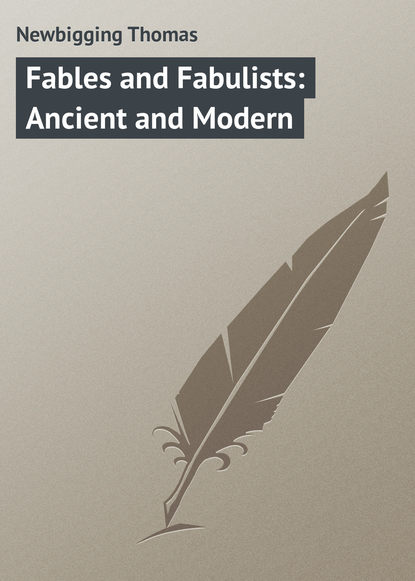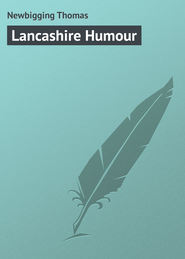По всем вопросам обращайтесь на: info@litportal.ru
(©) 2003-2024.
✖
Fables and Fabulists: Ancient and Modern
Настройки чтения
Размер шрифта
Высота строк
Поля
Till life's poor transient night is spent,
Respecting in each other's case
The gifts of nature and of grace.
Those Christians best deserve the name
Who studiously make peace their aim;
Peace both the duty and the prize
Of him that creeps and him that flies.'
Other excellent fables of Cowper will occur to the reader, as, for example: The Raven, The Contest between Nose and Eyes, The Poet, the Oyster and the Sensitive Plant, and Pairing Time Anticipated.
The Boy and the Rainbow (William Wilkie, D.D.)
'Declare, ye sages, if ye find
'Mongst animals of every kind,
Of each condition, sort, and size,
From whales and elephants to flies,
A creature that mistakes his plan,
And errs so constantly as man.
Each kind pursues his proper good,
And seeks for pleasure, rest, and food,
As Nature points, and never errs
In what it chooses and prefers;
Man only blunders, though possest
Of talents far above the rest.
Descend to instances, and try:
An ox will scarce attempt to fly,
Or leave his pasture in the wood
With fishes to explore the flood.
Man only acts, of every creature,
In opposition to his nature.
The happiness of humankind
Consists in rectitude of mind,
A will subdued to reason's sway,
And passions practised to obey;
An open and a gen'rous heart,
Refined from selfishness and art;
Patience which mocks at fortune's pow'r,
And wisdom never sad nor sour:
In these consist our proper bliss;
Else Plato reasons much amiss.
But foolish mortals still pursue
False happiness in place of true;
Ambition serves us for a guide,
Or lust, or avarice, or pride;
While reason no assent can gain,
And revelation warns in vain.
Hence, through our lives in every stage,
From infancy itself to age,
A happiness we toil to find,
Which still avoids us like the wind;
Ev'n when we think the prize our own,
At once 'tis vanished, lost and gone.
You'll ask me why I thus rehearse
All Epictetus in my verse,
And if I fondly hope to please
With dry reflections such as these,
So trite, so hackneyed, and so stale?
I'll take the hint, and tell a tale.
One evening, as a simple swain
His flock attended on the plain,
The shining bow he chanced to spy,
Which warns us when a shower is nigh;
With brightest rays it seemed to glow,
Its distance eighty yards or so.
This bumpkin had, it seems, been told
The story of the cup of gold,
Which fame reports is to be found
Just where the rainbow meets the ground.
He therefore felt a sudden itch
To seize the goblet and be rich;
Hoping – yet hopes are oft but vain —
No more to toil through wind and rain,
But sit indulging by the fire,
Midst ease and plenty, like a squire.
He marked the very spot of land
On which the rainbow seemed to stand,
And, stepping forwards at his leisure,
Expected to have found the treasure.
But as he moved, the coloured ray
Still changed its place and slipt away,
As seeming his approach to shun.
From walking he began to run,
But all in vain; it still withdrew
As nimbly as he could pursue.
At last, through many a bog and lake,
Rough craggy road and thorny brake,
It led the easy fool, till night
Approached, then vanished in his sight,
And left him to compute his gains,
With nought but labour for his pains.'
Professor Rankine evidently took Æsop's illustration of 'The Bow Unbent' to heart, when, relaxing his severer studies, he occupied occasional hours in composing 'Songs and Fables.' The three following pieces are examples of his work as a fabulist, and of his skill in interpreting the meaning of popular signs:
'The Magpie and Stump.– A magpie was in the habit of depositing articles which he pilfered in the hollow stump of a tree. "I grieve less," the stump was heard to say, "at the misfortune of losing my branches and leaves, than at the disgrace of being made a receptacle for stolen goods." Moral: Infamy is harder to bear than adverse fortune.'
'The Green Man.– A green man, wandering through the Highlands of Scotland, discovered, in a sequestered valley, a still, with which certain unprincipled individuals were engaged in the illicit manufacture of aqua-vitæ. Being, as we have stated, a green man, he was easily persuaded by those unprincipled individuals to expend a considerable sum in the purchase of the intoxicating produce of their still, and to drink so much of it that he speedily became insensible. On awaking next morning, with an empty purse and an aching head, he thought, with sorrow and shame, what a green man he had been. Moral: He who follows the advice of unprincipled individuals is a green man indeed.'
'The Bull and Mouth.– A native of the Sister Isle having opened his mouth during a convivial entertainment, out flew a bull, whereupon some of the company manifested alarm. "Calm your fears," said the sagacious host; "verbal bulls have no horns." Moral: Harmless blunders are subjects of amusement rather than of consternation.'
The following curious 'Birth Story,' from the collection of Indian Fables by Mr. P. V. Ramaswami Raju, is an ironical commentary on the doctrine of transmigration, in which the followers of Buddha implicitly believe:
Respecting in each other's case
The gifts of nature and of grace.
Those Christians best deserve the name
Who studiously make peace their aim;
Peace both the duty and the prize
Of him that creeps and him that flies.'
Other excellent fables of Cowper will occur to the reader, as, for example: The Raven, The Contest between Nose and Eyes, The Poet, the Oyster and the Sensitive Plant, and Pairing Time Anticipated.
The Boy and the Rainbow (William Wilkie, D.D.)
'Declare, ye sages, if ye find
'Mongst animals of every kind,
Of each condition, sort, and size,
From whales and elephants to flies,
A creature that mistakes his plan,
And errs so constantly as man.
Each kind pursues his proper good,
And seeks for pleasure, rest, and food,
As Nature points, and never errs
In what it chooses and prefers;
Man only blunders, though possest
Of talents far above the rest.
Descend to instances, and try:
An ox will scarce attempt to fly,
Or leave his pasture in the wood
With fishes to explore the flood.
Man only acts, of every creature,
In opposition to his nature.
The happiness of humankind
Consists in rectitude of mind,
A will subdued to reason's sway,
And passions practised to obey;
An open and a gen'rous heart,
Refined from selfishness and art;
Patience which mocks at fortune's pow'r,
And wisdom never sad nor sour:
In these consist our proper bliss;
Else Plato reasons much amiss.
But foolish mortals still pursue
False happiness in place of true;
Ambition serves us for a guide,
Or lust, or avarice, or pride;
While reason no assent can gain,
And revelation warns in vain.
Hence, through our lives in every stage,
From infancy itself to age,
A happiness we toil to find,
Which still avoids us like the wind;
Ev'n when we think the prize our own,
At once 'tis vanished, lost and gone.
You'll ask me why I thus rehearse
All Epictetus in my verse,
And if I fondly hope to please
With dry reflections such as these,
So trite, so hackneyed, and so stale?
I'll take the hint, and tell a tale.
One evening, as a simple swain
His flock attended on the plain,
The shining bow he chanced to spy,
Which warns us when a shower is nigh;
With brightest rays it seemed to glow,
Its distance eighty yards or so.
This bumpkin had, it seems, been told
The story of the cup of gold,
Which fame reports is to be found
Just where the rainbow meets the ground.
He therefore felt a sudden itch
To seize the goblet and be rich;
Hoping – yet hopes are oft but vain —
No more to toil through wind and rain,
But sit indulging by the fire,
Midst ease and plenty, like a squire.
He marked the very spot of land
On which the rainbow seemed to stand,
And, stepping forwards at his leisure,
Expected to have found the treasure.
But as he moved, the coloured ray
Still changed its place and slipt away,
As seeming his approach to shun.
From walking he began to run,
But all in vain; it still withdrew
As nimbly as he could pursue.
At last, through many a bog and lake,
Rough craggy road and thorny brake,
It led the easy fool, till night
Approached, then vanished in his sight,
And left him to compute his gains,
With nought but labour for his pains.'
Professor Rankine evidently took Æsop's illustration of 'The Bow Unbent' to heart, when, relaxing his severer studies, he occupied occasional hours in composing 'Songs and Fables.' The three following pieces are examples of his work as a fabulist, and of his skill in interpreting the meaning of popular signs:
'The Magpie and Stump.– A magpie was in the habit of depositing articles which he pilfered in the hollow stump of a tree. "I grieve less," the stump was heard to say, "at the misfortune of losing my branches and leaves, than at the disgrace of being made a receptacle for stolen goods." Moral: Infamy is harder to bear than adverse fortune.'
'The Green Man.– A green man, wandering through the Highlands of Scotland, discovered, in a sequestered valley, a still, with which certain unprincipled individuals were engaged in the illicit manufacture of aqua-vitæ. Being, as we have stated, a green man, he was easily persuaded by those unprincipled individuals to expend a considerable sum in the purchase of the intoxicating produce of their still, and to drink so much of it that he speedily became insensible. On awaking next morning, with an empty purse and an aching head, he thought, with sorrow and shame, what a green man he had been. Moral: He who follows the advice of unprincipled individuals is a green man indeed.'
'The Bull and Mouth.– A native of the Sister Isle having opened his mouth during a convivial entertainment, out flew a bull, whereupon some of the company manifested alarm. "Calm your fears," said the sagacious host; "verbal bulls have no horns." Moral: Harmless blunders are subjects of amusement rather than of consternation.'
The following curious 'Birth Story,' from the collection of Indian Fables by Mr. P. V. Ramaswami Raju, is an ironical commentary on the doctrine of transmigration, in which the followers of Buddha implicitly believe:






